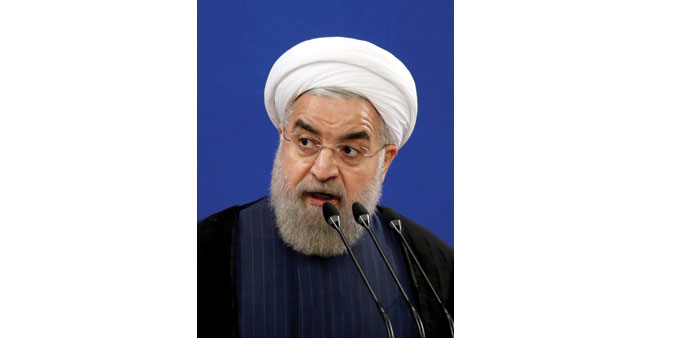Agencies/Dubai
Iran’s military capability has not been affected by its nuclear deal last month with six world powers, President Hassan Rouhani said yesterday, moving to reassure hardliners that the deal was no sign of Iranian weakness.
“With regards to our defensive capability, we did not and will not accept any limitations,” Rouhani said at a press conference carried on live television.
“We will do whatever we need to do to defend our country, whether with missiles or other methods.”
Last week, Iran unveiled a new surface-to-surface missile it said could strike targets with pinpoint accuracy within a range of 500km, a move likely to worry Tehran’s regional rivals.
Rouhani said at the ceremony that Iran’s military might was a precondition for peace, after being criticised by hardline factions in Iran’s multi-tiered leadership for negotiating with Western powers they see as fundamentally hostile to the Islamic Republic.
Under the July 14 pact, Iran agreed to strict limitations on its nuclear programme to ensure it cannot be turned to developing atomic bombs, in exchange for a removal of international sanctions imposed on Tehran. Iran denies ever seeking bomb capability from its nuclear programme.
According to the deal, any transfer to Iran of ballistic missile technology during the next eight years will be subject to the approval of the UN Security Council, and the United States has promised to veto any such requests.
An arms embargo on conventional weapons also stays, preventing their import into and export out of Iran for five years.
Rouhani also said the United States could assist Iran in reconfiguring a research reactor so it can comply with the terms of the deal.
“We will work with China and also, possibly, the US in modernising the reactor at Arak,” he said.
Changing the operations at Arak so the reactor no longer produces plutonium as a waste product was one of the key points of the deal.
Until Rouhani’s statements yesterday, China had been the only international partner mentioned for the Arak project.
Few US companies have operations in Iran, given decades of animosity between the two governments. They have not had diplomatic relations since the 1979 Iranian revolution and the hostage crisis at the US embassy in Tehran.
On the domestic political front, Rouhani signalled there would be no quick resolution to the house arrest of the reformist political leaders who said an election was rigged in 2009.
Though not mentioned by name, the house arrest of Mir Hossein Mousavi and Mehdi Karroubi was raised at the press conference to mark the start of Rouhani’s third year in office.
Mousavi and Karroubi have been under such restrictions since 2011. Both said that the presidential election two years earlier, which saw Mahmoud Ahmadinejad re-elected, was fraudulent.
A reporter asked Rouhani why, despite “reviving” hopes that the two former presidential candidates may be released, though again not naming them, “we have not seen anything” on the issue.
“The government cannot do everything on its own,” Rouhani replied, acknowledging that the matter remained unsolved but suggesting it could be ended.
“I have made my efforts for resolving political and social problems but... more explanations can be given at the time within the framework of national interests.
“It is not vital for everything to be announced.
“We must have patience to be able to resolve and finalise issues at an appropriate time.”
The question of jailed political prisoners and the house arrest of Mousavi and Karroubi has become pertinent as Rouhani said in 2013 before being elected that he hoped it could be tackled.

Rouhani speaks during a press conference in Tehran yesterday.
